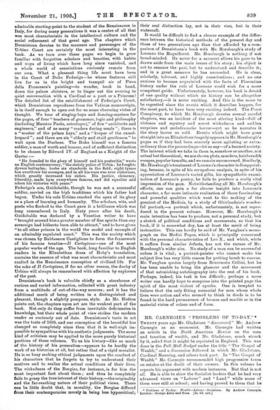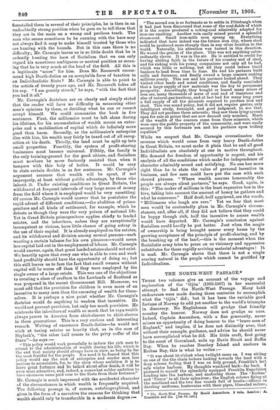MR. CARNEGIE'S "PROBLEMS OF TO-DAY."* TWENTY years ago Mr. Gladstone
" discovered " Mr. Andrew Carnegie as an economist. Mr. Carnegie bad written an article in the North American Review on the uses and taxation of wealth, and Mr. Gladstone, much struck by it, asked that it might be reprinted in England. This was done in the Pall Mall Budget under the title "The Gospel of Wealth," and a discussion followed in which Mr. Gladstone, Cardinal Manning, and others took part. In "The Gospel of Wealth" Mr. Carnegie recommended high progressive taxes on estates at the death of their owners. In Ulla volume Ile repeats his argument with modern instances. But that is not all. He is able to show the Socialist leaders that he had very advanced views on "Labour" and " Land " while some of them were still at school; and having proved to them that he • Problems of To•clay Wealth—Labour—Socialism. By Andrew Carnegie. London : George Allen and Sons N. 6d. net.)
forestalled them in several of their principles, he is then in an undoubtedly strong position when he goes on to tell them that they are in the main on a wrong and perilous track. The man who seems sometimes to be running with the hare may not always find it easy to make himself trusted by those who are hunting with the hounds. But in this case there is no difficulty; Mr. Carnegie leaves us in so little doubt that he is ardently hunting the hare of Socialism that we can only regard his sometimes ambiguous or neutral position as mean- ing that he is very much at the head of the field. All this is a legitimate "score" for him. Does Mr. Roosevelt recom- mend high Death-duties as an acceptable form of taxation in an Individualistic State ? Mr. Carnegie is able to point to the article of twenty years ago, and Mr. Roosevelt takes off his cap. "I am greatly struck," he says, "with the fact that you had it all."
Mr. Carnegie's doctrines are so clearly and simply stated that the reader will have no difficulty in measuring other men's opinions by them, or deciding what he can or cannot accept himself. We could summarise the book in five sentences. First, the millionaire must be left alone during his lifetime, for his accumulation of wealth means an enter- prise and a mobilisation of capital which do infinitely more good than harm. Secondly, as the millionaire's enterprise dies with him, his wealth may fairly be taxed out of all recog- nition at his death. Thirdly, the land must be split up into small properties. Fourthly, the system of profit-sharing businesses must become universal. Fifthly, the family is the only training-ground for the good citizen, and Socialism must nowhere be more furiously resisted than when it tampers with this holy of holies. It would be easy to state certain doubts in as few sentences. Mr. Carnegie's argument assumes that wealth will be spent, if not improperly, at least without public advantage, by those who inherit it. Under existing conditions in great Britain, the withdrawal at frequent intervals of very large sums of money from the field where it is employed would be very unsettling.
Of course Mr. Carnegie would answer that he postulates the rapid advent of different conditions,—the abolition of primo- geniture and all kinds of settlement, for example, which he detests as though they were the very poison of national life.
Yet in Great Britain primogeniture applies chiefly to landed estates, and the inheritors, unless they are exceptionally incompetent or vicious, have little chance of going astray in the use of their capital. It is already employed on the estates, and its withdrawal and division among several persons—each wanting a certain balance for his own pleasure—would mean less capital laid out in the employment of labour. Mr. Carnegie would answer, again, that great landed estates should not exist.
We heartily agree that every one who is able to own and work land profitably should have the opportunity of doing so ; but this still leaves us to face the fact that small owners without capital will be worse off than if they were employed by the single owner of a large estate. This was one of the objections to creating a class of crofters in the Lowlands of Scotland as was proposed in the recent Government Bill. Moreover, we must add that the provision for children is even more of an incentive to many men than the amassing of wealth for them- selves. It is perhaps a nice point whether Mr. Carnegie's doctrine would do anything to weaken that incentive. He would not prevent provision, but only too much provision. He mistrusts the inheritors of wealth so much that he saya wealth always passes in America from shirt-sleeves to shirt-sleeves in three generations. This is a very curious and interesting remark. Writing of enormous Death-duties—he would not stick at taxing estates so heavily that, as in the case of Shylock's, "the other half comes to the privy coffer of the State "—he says :—
" This policy would work powerfully to induce the rich man to attend to the administration of wealth during his life, which is the end that society should always have in.view, as being by far the most fruitful for the people. Nor need it be feared that this policy would sap the root of enterprise and render men less anxious to accumulate, for, to the class whose ambition it is to leave great fortunes and be talked about after death, it will be even more attractive, and, indeed, a somewhat nobler ambition to have enormous sums paid over to the State from their fortunes."
Mr. Carnegie is much impressed with the accidental character of the circumstances in which wealth is frequently acquired.
The following passage is, of course, autobiographical, and gives in the form of a narrative the reasons for thinking that wealth should only be transferable in a moderate degree:.
" The second son is so fortunate as to settle in Pittsburgh when it had just been discovered that some of the coal-fields of which it is the centre produced a coking-coal admirably adapted for iron-ore smelting. Another vein easily mined proved a splendid steam-coal. Small iron-mills soon sprang up. Everything indicated that here indeed was the future iron city, where steel could be produced more cheaply than in any other location in the world. Naturally, his attention was turned in this direction. He wooed the genius of the place. This was not anything extra- ordinarily clever. It was in the air. He is entitled to credit for having abiding faith in the future of his country and of steel, and for risking with his young companions not only all he had, which was little or nothing, but all they could induce timid bankers to lend from time to time. He and his partners built mills and furnaces, and finally owned a large concern making millions yearly. This son and his partners looked ahead. They visited other lands and noted conditions, and finally concluded that a large supply of raw materials was the key to permanent prosperity. Accordingly, they bought or leased many mines of iron ore, many thousands of acres of coal and of limestone and also of natural-gas territory, and at last had for many long years a full supply of all the minerals required to produce iron and steel. This was sound policy, but it did not require genius, only intelligent study, foresight, and good judgment, to see that. They did not produce these minerals ; they saw them lying around open for sale at prices that are now deemed only nominal. Much of the wealth of the concern came from these minerals, which were once the public property of the community, and were easily secured by this fortunate son and his partners upon trifling royalties."
While we suspect that Mr. Carnegie overestimates the revenue which would come from very heavy Death-duties in Great Britain, we must make it plain that he and all good Individualists are absolutely at one in motive throughout. His demand for freedom of opportunity is cogent, and his analysis of all the conditions which make for independence of character admirably sound and satisfying. No one has more right than he to state the value of personal incentive in business, and few men could have put the case with such shrewd phrases. "Where wealth accrues honourably the people are always silent partners," he says. Good, again, is this: "The maker of millions is the least expensive bee in the hive, taking into account the amount of honey he gathers and what he consumes." Half droll, half aggrieved, are the words, " Millionares who laugh are rare." Yet we fear that most men would be contentedly glum in Mr. Carnegie's circum- stances, and, after all, if they did not believe that they could be happy though rich, half the incentive to amass wealth would have departed. Mr. Carnegie's conclusion against Socialism could hardly be put better. Just when the magio of ownership is being brought nearer every home by the growing acceptance of the principle of profit-sharing, and by the breaking up of the land,—this is the moment when the Socialistic army tries to press on us visionary and oppressive substitutes for these rapidly arriving material advantages! It is mad. Mr. Carnegie shows that there is not a single craving natural in the people which cannot be gratified by Individualism.

































































 Previous page
Previous page